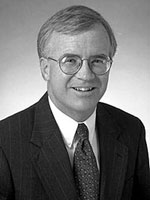 Professionals and
Moral Responsibility Professionals and
Moral Responsibility
Robert F. Cochran, Jr.
Pepperdine University
Wednesday, September 28, 2005
12:50 to 1:40 p.m.
Hulston
Hall, Room 7 (School of Law)
Robert F. Cochran, Jr., is the Louis D. Brandeis Professor of Law
and Director of the Institute on Law, Religion, and Ethics at Pepperdine
University. Professor Cochran is the co-author of Lawyers, Clients,
and Moral Responsibility; Cases and Materials on the Rules
of the Legal Profession; The Counselor-at-Law: A Collaborative
Approach to Client Interviewing and Counseling; Christian
Perspectives on Legal Thought; and Law and Community: The Case of
Torts.
Lecture Abstract
Almost all professionals, including medical personnel, clergy, lawyers,
psychologists, and corporate executives face a common problem. They
come to their work with their own moral values, but they work for other
people who may have different moral values. Should a counselee divorce
her spouse? Should a corporation consider the effects of its actions
on the environment? Should a patient have cosmetic surgery that carries
with it a risk of death? Should a client sue his brother alleging a
breach of trust?
Many of our students, along with their future patients, shareholders,
and clients will face questions like this. Learning how to address
such questions should be a significant part of the moral education
of anyone who is going to enter a profession. Two questions typically
define the moral relationship of the professional and the person for
whom she works:
- In making decisions, are the interests of
other people considered?
- Who controls the decision?
Some professionals are authoritarian, telling
their clients, patients, etc. what to do. Other professionals are
deferential, having no input in decisions and working under a sort
of vicarious morality. Another option, which may be available in
some relationships, is communitarian—the professional and client
decide together what course to take.
Everyone is invited to attend this distinguished
public lecture.
Print
a Lecture Flyer
|